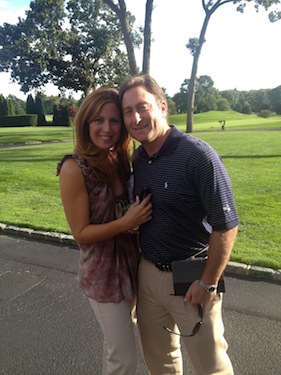When Adversity Leads to Advocacy: Families Fighting Flu
- Saturday, 09 November 2013 15:46
- Last Updated: Sunday, 10 November 2013 08:04
- Published: Saturday, 09 November 2013 15:46
- Hits: 10367
 On a mild but gray Wednesday morning in Scarsdale Village, I had the opportunity to meet with Alissa Kanowitz. Alissa is a Scarsdale resident and, among other things, a mother, a wife, a real estate agent at Houlihan Lawrence, a Junior League volunteer, and an activist. Although proud of her achievements, as any activist should be, no one wants to become an activist because of the untimely death of their child. Not quite 10 years ago, her daughter, Amanda, died of influenza.
On a mild but gray Wednesday morning in Scarsdale Village, I had the opportunity to meet with Alissa Kanowitz. Alissa is a Scarsdale resident and, among other things, a mother, a wife, a real estate agent at Houlihan Lawrence, a Junior League volunteer, and an activist. Although proud of her achievements, as any activist should be, no one wants to become an activist because of the untimely death of their child. Not quite 10 years ago, her daughter, Amanda, died of influenza.
Amanda Kanowitz was a happy, sweet, and beautiful 4 ½-year-old. On the morning of March 1, 2004, Alissa and her husband Richard awoke to every parent's worst nightmare. They found their daughter lifeless in her bed. She had been healthy up until two days earlier when she contracted the flu. Amanda did not appear to have a severe case - she was coughing and then vomiting, but never with a high fever. Even just hours before they found her, she had been awake, speaking, and drinking. The flu vaccine was not yet indicated for Amanda's age group so she had not been vaccinated. That season, 152 other children died of the same cause: influenza.
To honor Amanda's memory, the Kanowitz family established the Amanda Kanowitz Foundation and co-founded Families Fighting Flu (FFF), www.familiesfightingflu.org, a non-profit consisting primarily of families who have lost or almost lost a child to the flu virus. The family portraits on the FFF website are numerous: On January 12th, 2011, 17-year-old Austin Booth, a previously healthy, athletic boy began to feel sick while at basketball practice. Five days later, Austin died from the flu. On February 13th, 2010, Chance Chandler went to a party. By evening, he felt ill and started vomiting. Two days later Chance stopped breathing. He was four years old and died of flu. Neither child received the flu vaccine that year, although Chance received the vaccine the year prior. His parents did not know that he needed to be vaccinated annually.
Families Fighting Flu (FFF), www.familiesfightingflu.org, a non-profit consisting primarily of families who have lost or almost lost a child to the flu virus. The family portraits on the FFF website are numerous: On January 12th, 2011, 17-year-old Austin Booth, a previously healthy, athletic boy began to feel sick while at basketball practice. Five days later, Austin died from the flu. On February 13th, 2010, Chance Chandler went to a party. By evening, he felt ill and started vomiting. Two days later Chance stopped breathing. He was four years old and died of flu. Neither child received the flu vaccine that year, although Chance received the vaccine the year prior. His parents did not know that he needed to be vaccinated annually.
What was your motivation for launching "Families Fighting Flu"? When we learned that Amanda died from influenza, we were shocked. Everyone we told had a similar response, "What do you mean she died of the flu? People don't DIE from the flu." Most people – including us until this happened – refer to most random stomach bugs or fever viruses as 'the flu' so nobody really thinks of it as anything that serious. We learned the hard way, that influenza, the real flu, is a very distinct and potentially devastating virus that takes the lives of up to 40,000 Americans each year and is responsible for 200,000 annual hospitalizations. When you lose a child, you naturally feel guilt and helplessness. There was nothing more that we could do for Amanda, but we felt we owed it to her to make something meaningful come from her death. So Richard and I set out to raise awareness about the risks of influenza and reduce the number of pediatric hospitalizations and deaths. Since vaccination is so effective in preventing this illness, this is FFF's main focus. Families Fighting Flu is also there to provide support for other families and communities that have been impacted by tragedies caused by influenza. There were no other groups like this when we started the organization.
When you lose a child, you naturally feel guilt and helplessness. There was nothing more that we could do for Amanda, but we felt we owed it to her to make something meaningful come from her death. So Richard and I set out to raise awareness about the risks of influenza and reduce the number of pediatric hospitalizations and deaths. Since vaccination is so effective in preventing this illness, this is FFF's main focus. Families Fighting Flu is also there to provide support for other families and communities that have been impacted by tragedies caused by influenza. There were no other groups like this when we started the organization.
How did your advocacy help to encourage CDC to change the age recommendation for the flu vaccine? At the time of Amanda's death, the flu vaccine was only recommended for the elderly, the very young (between 6-23 months) and immune-compromised people. Yet when I spoke with many of the top U.S. infectious disease experts, they unanimously agreed that the flu vaccine recommendations should include all children. When the CDC changes policy, they need to consider various concerns from local governments, federal agencies, vaccine manufacturers, medical professionals and the general public. Their decisions are based on extensive analysis and epidemiological evidence, but these are numbers on a page. Families Fighting Flu attached real faces, like that of Amanda's, to the numbers and helped create the urgency needed to change the recommendations before more children died.
What do you say to people who are scared to get the flu vaccine for one reason or another? People should speak with their doctors about the benefits of the flu vaccine versus the nominal risks. Overwhelmingly, pediatricians agree that the influenza vaccine is the single most effective way to protect your child against the flu. Even if it is not 100% effective at preventing the flu -- and we all acknowledge that -- a case of the flu will be less severe if your body has been previously exposed to the virus, i.e. has built up antibodies to it, and this makes the vaccine very effective at preventing hospitalizations and death.
Look, none of us like to give our children shots or subject them to unpleasant experiences, but an actual bout of influenza is exponentially more miserable. Keep in mind that approximately 1/3 of all children will get influenza in any given year. One quick shot can spare you from a week or more of the flu and the entire family becoming sick. There is also a nasal mist alternative to the shot, indicated for people between the ages of 2-49. What are the most common reasons you hear from people about why they don't get vaccinated? Something I commonly hear is, "Our family doesn't get the flu." It's not a family values thing- you don't choose to not get the flu. You only choose for yourself and/or your children to or to not get vaccinated. The flu decides it's victims and it's smarter and sneakier than any of us. It's been around for thousands of years. You have no way to know how your child's body will respond to each individual strain of influenza. If you've never had the flu and you skip the vaccine, you're lucky; but statistically speaking, your family will get the flu in time. And when you do, you will likely infect other people. Although your own family may recover from the flu, you could be responsible for the hospitalization or death of the infant or immune-compromised person who was behind you in the checkout line the day before you realized you had the flu.
What are the most common reasons you hear from people about why they don't get vaccinated? Something I commonly hear is, "Our family doesn't get the flu." It's not a family values thing- you don't choose to not get the flu. You only choose for yourself and/or your children to or to not get vaccinated. The flu decides it's victims and it's smarter and sneakier than any of us. It's been around for thousands of years. You have no way to know how your child's body will respond to each individual strain of influenza. If you've never had the flu and you skip the vaccine, you're lucky; but statistically speaking, your family will get the flu in time. And when you do, you will likely infect other people. Although your own family may recover from the flu, you could be responsible for the hospitalization or death of the infant or immune-compromised person who was behind you in the checkout line the day before you realized you had the flu.
I also hear people say, "I felt sick after getting the vaccine one year." Fall is when the current year's flu vaccines are available, and it's also the time of year that lots of non-flu viruses are going around that are often mistaken for a side effect of the vaccine. You cannot catch the flu from the flu vaccine, but as your body builds immunity to the virus in the vaccine, some people may feel a bit under the weather for a day. Given that a true case of influenza can and does cause hospitalization and death, any side effect of the flu vaccine seems mild in comparison.
Are there any warning signs that your child may be at risk of death from the flu? Because of the fact that no one knows what causes some people (like Amanda) to respond so suddenly, severely, and systemically to influenza and other people to respond with a more controlled immune reaction, the best way to protect yourself and your family against the risk of death from the flu is to get vaccinated. It is so important to note that many children who have severe reactions to the flu were playing sports or at birthday parties only hours before crashing. That's what is so scary about the flu. One mom who is a part of FFF was even on her way to getting her child's Tamiflu prescription filled when her son died of the flu. However, signs that your child is not doing well, whether due to the flu or any other virus or infection, include fast or difficult breathing, bluish skin color or lip color, not drinking enough fluids or urinating, changes in mental status, and high (>100.4) or low (<96.8) fever, among other things. You should call your doctor or take your child to the ER if you notice any of these symptoms or a worsening of other flu-related symptoms.
Any parting words? The good news is that due to CDC and American Academy of Pediatrics (AAP) recommendations and increased awareness, more people are getting vaccinated. The recommendations are that children 6 months and up get vaccinated annually. There are 60,000 pediatrician members of AAP, so you can feel confident knowing that there are tens of thousands of pediatricians that are part of an organization that knows the data is strong enough in favor of the flu vaccine to support across-the-board immunization in children.
Most people think that things like this don't happen to people they know. But if it could happen to our sweet, happy, healthy little girl, it could happen to your family. Don't let that happen. Protect your family, and help protect other families, too. All it takes is a quick trip to the pediatrician or a pharmacy.
Click here for more information from the American Academy of Pediatrics and the Center for Disease Control.